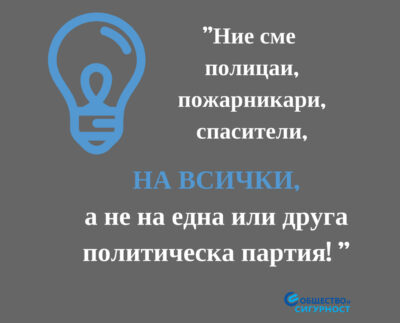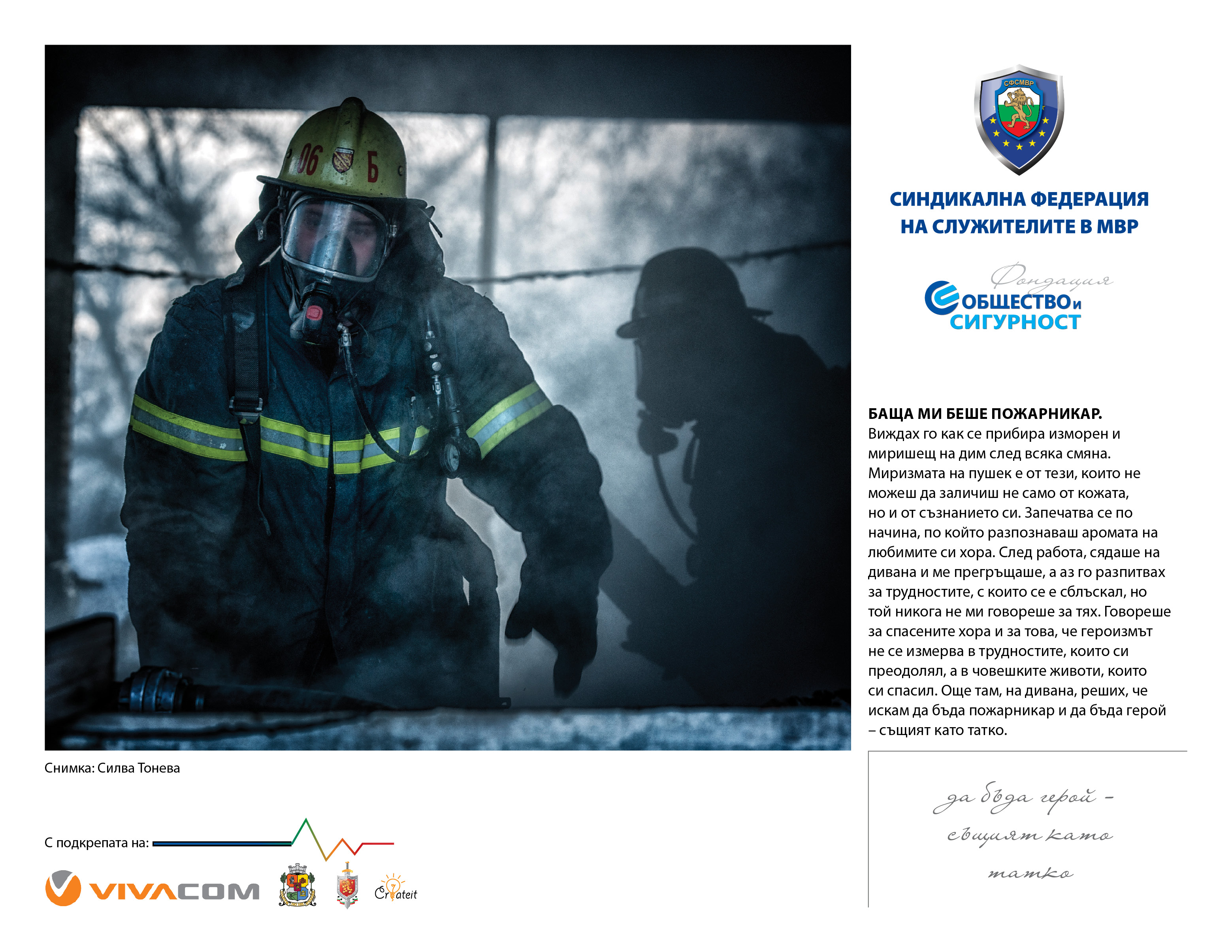- 25.01.2017
MoI: in cervice of people or politicians?
If any government had been replaced it always brought ad hoc and politically motivated changes. These changes are quite often and the main reason for the occupational stress and insecurity about their jobs among police officers, firefighters, rescuers and all workers in Ministry ot Interior. It has been said that…
- 01.09.2016
The issues in National System 112 in Bulgaria
In 2015, 4,686,390 emergency calls are accepted and only 1,987,576 are real. Who is responsible for the unreal signals received? Who educates the citizens? Who and how impose sanctions for the unreal signals? Who measures the potential risk to the citizens? The debate on the reform of the Ministry of…
- 19.07.2016
My father was a firefighter!
My father was a firefighter. I was seeing him at home tired and smelled of smoke after each shift. The smell of smoke is one of those you can not erase not only from yout skin, but mind. It is sealed in your mind on the same way how you can…
- 19.07.2016
I am a mother!
“I am a mother and my daughter is very proud that I’m a police woman. She knows that I look out not only for her safety and security, but also for her friends in kindergarten. What she doesn’t known is that I am dreaming for the day when the system will be…
- 19.07.2016
We, the Bulgarians!
“Do you know, we all Bulgarians, are sad people. We taunt the police, sing humiliating songs about police officers, spit it out and caricature the system, and when we are in trouble precisely the police officer is the only one who can help and immediately we are changing the attitudes…
- 19.07.2016
The policeman, who chose the profession, because of the love to his father…
“Unlike many of my colleagues, no one in my family was not a policeman, but I made this choice, because of my father. My father creates and sculpts figures and whole life is giving life to the tree. He wanted to see peculiar for his work – he wanted his…
- 19.07.2016
The lonely firefighters
Quite offten we can see firefighters who are fighting the firestorm and stand against it alone, but surounded by at least two or three fire trucks. Have you ever wondered what is due to the fact that the number of firefighters is equal to the number of firefighting vehicles? The…
- 23.06.2016
Children on duty!
A few months ago I was out playing basketball with my children when the ball rolled into the street. I went to it, but suddenly the laugh of my children disappeared and they froze. They saw two patrol cars on the corner. The vehicles turned and were moving slowly towards…
- 30.03.2016
Managing traumatic stress: Coping with terrorism
Terrorism threatens a society by instilling fear and helplessness in its citizens. It seeks to hold a society or government hostage by fear of destruction and harm. When terrorist acts occur, people generally look for ways to cope with the acute stress and trauma. Terrorism evokes a fundamental fear of…
- 08.03.2016
Meet Mariela. One of the women sharing and living with those who care for us.
“My husband was forced to learn how to cope alone with stress at the workplace. He did it, because it was the only way to protect us. He did it, because what he knows and happens to him, not only would frightened us, but terrified. Very often I feel the…
- 25.12.2015
The person behind the uniform: Ivo
In the first part of the series “The person behind the uniform” we are introducing you Ivo – a firefighter in Varna, beloved husband and father. The series will meet you with law enforcement officers across the country. #reform #togetherwecan
- 13.02.2015
How MoI must look like in 15 years?
MoI officers and representatives of civil society participated in the process of identification of approaches came to a basic conclusion: before a vision and develop a strategy for long-term reform to be created it is necessarily a broad public discussion with representatives of NGOs, professional and trade union organizations to…
- 13.02.2015
How do we see the participation of civil and professional organizations in Ministry of Interior’s reforming?
The most important element of the whole process is institutionalized of forms and procedures for citizen participation in reforming the Ministry of Interior. The second crucial component is uniting around the need to prepare a long-term strategy to reform the Ministry of Interior, to be adopted as the Ministry of…
- 03.02.2015
Citizen participation in MI: Mission (im) possible!
The main issue which united representatives of trade unions, professional organizations and NGOs in terms of public order and security, is that the “security” service provided to citizens, is not effective and does not meet their needs. The discussion about the parameters and expectations of what should the service be…
- 03.02.2015
The failed reform!
Ministry of Interior is the only unreformed Ministry in Bulgaria, but also one of the ministries in which structural changes are the most numerous. One of the major structural changes that contribute the MoI to become a mega-ministry is the closure of Ministry of Emergency Situations and merger it with…



